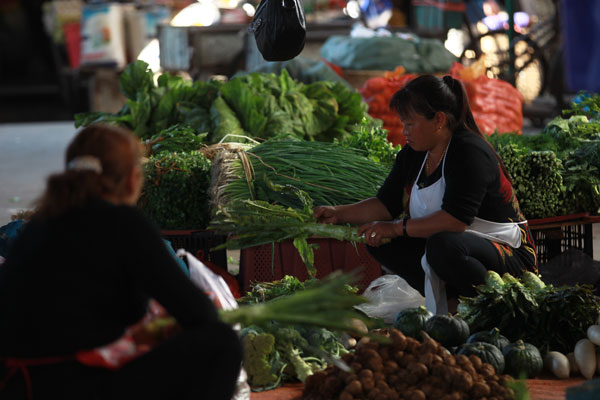Fear stalks land with abundance of natural resources
Updated: 2013-01-23 02:00
(China Daily)
|
|||||||||
On Jan 15, a bomb fell on Chinese territory, according to the Ministry of Foreign Affairs. Red national flags were raised on the Chinese houses along the border on Jan 18 to make their identity clear to the Myanmar air force. Following the bombing, security has been tightened in Nabang, with around 40 police officers patrolling the streets. Although many residents bought vegetables and meat at the morning market, retailers said the sharp decrease in incomes caused by the conflict has resulted in fewer people crossing the border to shop at Nabang's market.
A 50-year-old pork seller, surnamed Yu, said the price of pork has fallen to 24 yuan per kilogram from 30 yuan two months ago, further cutting her profit margin. "Sluggish demand from Kachin has pushed down the price here, but in other towns it has risen to 32 yuan a kilogram," said Yu.
 |
|
The vegetable market in Nabang has seen a drop in business. |
In the town, both the kyat — the currency of Myanmar — and the Chinese yuan were in use. Two Kachins shopping for pork at Yu's store were unable to afford the 45 yuan she asked after weighing a piece of meat. They only had 1,000 kyat (7.25 yuan / $1.16) to spend, so they slowly walked away and headed to a vegetable retailer to buy cabbage for 3 yuan.
"Things have changed a lot and the war has left the Kachin people unable to buy meat," sighed Yu.
Peace negotiations urged
Founded in 1961, the KIA has approximately 10,000 soldiers. After more than two decades of fighting, a cease-fire agreement was signed in 1994. Under the terms of the agreement, Myanmar's government offered to help the state with economic development and promised discussions about autonomy.
Under the Constitution of the Republic of the Union of Myanmar, which was adopted in 2008, all armed forces in the country must be placed under central military command. To achieve this, the government demanded that all cease-fire groups be incorporated into a single border guard force, which would entail disarming them, resupplying them with government-issued weapons and making them subordinate to regional Myanmar military commanders. Autonomy and political reconciliation were not up for discussion.

 Li Na on Time cover, makes influential 100 list
Li Na on Time cover, makes influential 100 list
 FBI releases photos of 2 Boston bombings suspects
FBI releases photos of 2 Boston bombings suspects
 World's wackiest hairstyles
World's wackiest hairstyles
 Sandstorms strike Northwest China
Sandstorms strike Northwest China
 Never-seen photos of Madonna on display
Never-seen photos of Madonna on display
 H7N9 outbreak linked to waterfowl migration
H7N9 outbreak linked to waterfowl migration
 Dozens feared dead in Texas plant blast
Dozens feared dead in Texas plant blast
 Venezuelan court rules out manual votes counting
Venezuelan court rules out manual votes counting
Most Viewed
Editor's Picks

|

|

|

|

|

|
Today's Top News
Boston bombing suspect reported cornered on boat
7.0-magnitude quake hits Sichuan
Cross-talk artist helps to spread the word
'Green' awareness levels drop in Beijing
Palace Museum spruces up
First couple on Time's list of most influential
H7N9 flu transmission studied
Trading channels 'need to broaden'
US Weekly

|

|








